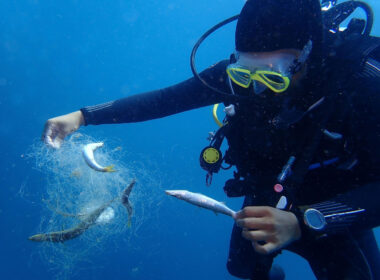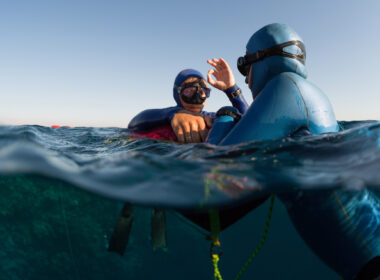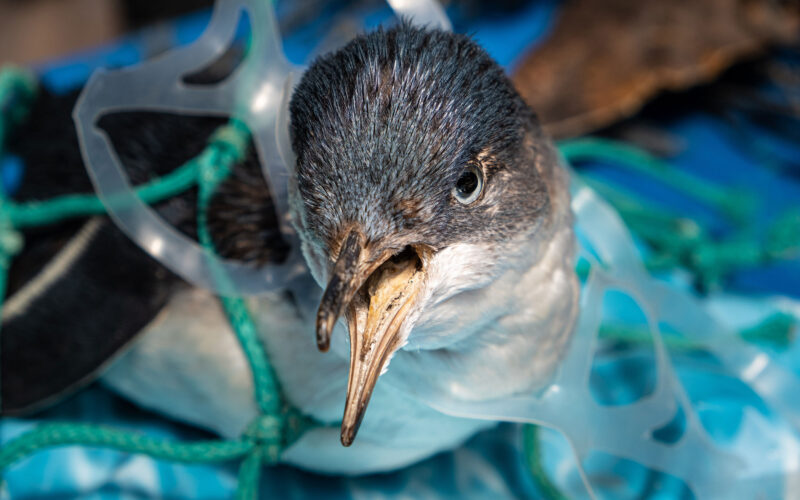As divers, we are all aware of the difficulties the world is facing with pollution and exploitation of resources whether on land or underwater. Some of these problems are too large for the single diver to tackle by themselves but there are many small steps we can take to lessen our negative imprint on our planet Ocean.
Here Are Our Top 6 Eco Goals for 2025
1. Dive Plastic Free.
From using a digital certification card and saying no to plastic printed ones to taking your own reusable drinking water bottle to the dive site and refusing bottled water, taking your own reusable shopping bag and refusing single use bags, no matter how much they say they are eco-friendly and biodegradable, there are many ways we can make a small difference. Initiate conversations with other divers or even the dive center staff and offer suggestions as to how they can make the switch from single-use to reusable.
Remember don’t preach and be kind, pass on your knowledge in a gentle way, discuss your own eco goals and swap ideas. If you get too emotional and start pointing fingers, people are less likely to listen to you and be empathetic towards your cause.
2. Improve Your Buoyancy.
Even if it is already good, it can always be better and the better your buoyancy, the less likely you are to accidentally damage the reef or other marine life. You could attend on a buoyancy specialty course or practice with a buddy or dive professional in confined water before your next open-water dive. As an added bonus, improving your buoyancy will improve your air consumption rate and you will look like a much more experienced diver.
Want to learn more? Read here about “The Importance of Good Buoyancy”.
3. Purchasing New Diving Equipment
A great eco goal is to purchase brand new dive gear only to add items you don’t yet own or to replace old and irreparable gear. Avoid unnecessary waste by only purchasing the equipment that you truly need and choose brands that avoid plastic packaging and offer eco alternatives or products made of recycled materials.
There are more and more diving brands that offer eco-friendlier gear, look into exposure suit alternatives to neoprene such as “Ariaprene”, yulex or “natural-prene”. If you are finished with an item of scuba gear, find out how best to dispose of it: can it be recycled in your area, could you pass it on to someone else to reuse or upcycle, could you repurpose it to use in your home as a nice piece of scuba diving decor, be creative!
4. Dive with Eco-friendly Dive Centers.
Research your dive centers and diving destinations, opt to dive with those who consciously make an effort to be as eco-friendly as possible by reducing their carbon footprint, diving in small groups, organizing beach and underwater clean-ups, not using single-use plastics, including a thorough briefing with how to behave underwater before each dive etc.
Check dive center websites, and reviews to see how active they are in sustainability and being eco friendly as well as environmentally aware. Do they have an eco tours badge from a recognized organization? Are they Green Fins members? Do they offer ecology programs or clean-up days?
5. Make a difference in your local area.
Volunteer for organizations that focus on conservation, reforestation, or protecting natural habitats. Patronize and promote local businesses that focus on sustainability and eco-friendly practices. Encourage businesses to create their own list of eco goals, reduce their environmental impact and support green initiatives. Start or support community gardens where locals can grow their own produce. This reduces the carbon footprint associated with food transportation and fosters a sense of community. Encourage the use of public transportation, carpooling, biking, and walking. Attend on a beach or underwater clean up. Take a trash bag with you on every dive or beach visit and take any items with you that don’t belong there.
Eco Tip: always take care when removing trash that nothing is living inside it and that you do not damage the environment in an attempt to remove an item.
6. Get educated!
Knowledge is key to sustainability. There are several effective ways to acquire knowledge in these areas. Firstly and most easily you can do your own online research to find out what problems the ocean is facing and how you can help with eco-friendly practices, such as changing the way you shop, finding eco friendly creams and cosmetics and especially reef safe sun creams. Other ways are to read books, online publications, attend or enroll in university courses or online programs. Engage with environmental organisation, watch documentaries and films to learn more about global issues.
Our Top Eco Goal: We recommend enrolling in the Green Fins Diver E-course to learn how to become more environmentally aware and enjoy zero impact dives.
Did you know? DiveAssure members enjoy a 10% discount off the Green fins E-Diver course.







The writing carries a layered depth, offering meaning on multiple levels. Each phrase contributes to an overarching resonance that is intellectual, emotional, and meditative, creating a reading experience that invites exploration, mindfulness, and profound reflection over time.